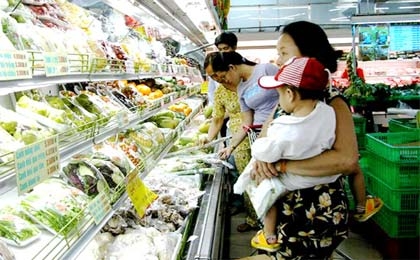Sudden CPI hike sparks concerns
As Vietnam’s gross domestic product (GDP) is expected to attain a high growth in the third quarter, the consumer price index (CPI) sudden rise in September is attracting some worried looks.
The General Statistics Office (GSO) last week reported that CPI rose 1.31 per cent on month in September, or 6.46 per cent in against December, 2009.
It was also the highest CPI rise since February, when it rose 1.96 per cent on month. The sudden rise has caught economists by surprise.
“It is very surprising. I could not imagine that prices have been rising sharply over the past month,” said Vu Dinh Anh, deputy director of the Institute for Markets and Prices under the Ministry of Finance.
 |
Food and construction material prices rose 2.32 and 1.08 per cent respectively, but the highest increase was seen in the education sector where prices rose 12 per cent on month, according to the GSO.
The depreciation of the local currency against the US dollar in August partly contributed to the price hike in September because of higher prices of imports, said Nguyen Duc Thang, vice head of the GSO’s Trade, Service and Price Department.
But Anh said the sudden CPI rise was not only caused by the recent depreciation of dong, but also increased gold price.
Anh said Vietnam’s inflation would not reach double-digit levels unless the government introduced new policies which might considerably impact on prices. “But it could be higher than the 8 per cent targeted by the National Assembly,” he said.
Le Dinh An, former director of the Ministry of Planning and Investment (MPI)’s National Centre for Socio-Economic Information and Forecast, said the economy had a good momentum over the past nine months, but inflation would be a big challenge in the next couple of months.
MPI vice minister Cao Viet Sinh last week said GDP could grow 6.5 per cent year-on-year during January to September.
For the whole year, the MPI predicts the economy will grow some 6.7 per cent.
However, An said a high inflation would be an obstacle for the government to implement growth support policies including lowering lending interest rates, which are viewed as the biggest hindrance for business development.
What the stars mean:
★ Poor ★ ★ Promising ★★★ Good ★★★★ Very good ★★★★★ Exceptional
 Tag:
Tag:
Related Contents
Latest News
More News
- TECHFEST Vietnam 2025 links startups with policy and capital (December 15, 2025 | 18:21)
- Long Thanh International Airport welcomes first Vietnam Airlines test flight (December 15, 2025 | 18:01)
- Foreign fruits flood Vietnamese market (December 09, 2025 | 13:22)
- Vietnam’s fruit and vegetable exports reach $7.8 billion in first 11 months (December 05, 2025 | 13:50)
- Vietnam shapes next-generation carbon market (November 26, 2025 | 15:33)
- PM urges Ho Chi Minh City to innovate and remain Vietnam’s economic locomotive (November 26, 2025 | 15:29)
- Experts chart Vietnam's digital finance path: high hopes, high stakes (November 14, 2025 | 10:56)
- Vietnam’s seafood imports surge 30 per cent in first 10 months (November 10, 2025 | 19:35)
- Vietnam’s durian exports hit $1 billion milestone (October 30, 2025 | 17:41)
- Beyond borders: Sunhouse and new era of Vietnamese brands on Amazon (October 28, 2025 | 10:46)






















 Mobile Version
Mobile Version